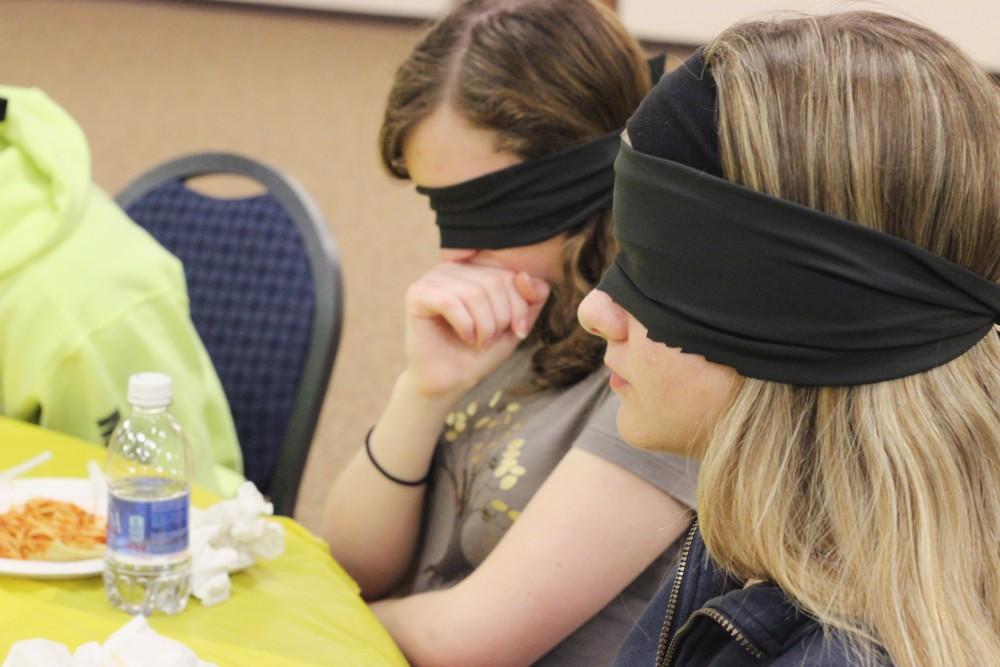Dinner in the Dark

GVL / Laine Girard Blind folded students experience the feeling of not being able to see during an event called “Dinner In the Dark.”
Apr 9, 2014
The world becomes dark as the strip of black cloth is tied around the participants’ heads. A few minutes later they feel a light tap on their shoulder. Their guide helps them to stand and leads them to the food table. Spaghetti is the main course with salad and breadsticks on the side. The slippery noodles are hard enough to eat when they are visible, but the temporarily blind participants struggle even more just trying to get the noodles on their forks.
On April 7, the Grand Valley State University Campus Lions Club held “Dinner in the Dark” as a fundraiser for Leader Dogs for the Blind, which offers programs for the blind, visually impaired or deaf-blind to help them travel independently.
During the event, participants were blindfolded while eating dinner to give them an idea of what it is like to perform an everyday activity without sight. Members of the Campus Lions Club acted as guides.
“We had several blind or visually impaired people in the audience, and we wanted our audience members to kind of experience what it’s like for them to eat a dinner while not having one of their primary senses,” said Jessica Wehby, president of Campus Lions.
The event also featured two blind GVSU students who spoke about some of their experiences.
Juanita Lillie, a senior at GVSU, recently studied abroad in Costa Rica.
“Once I arrived in Costa Rica, I had a bit of a culture shock in regards to my disability,” Lillie said. “Here in the U.S., people assume that you need help. ‘Let me take those items out of your hands.’ I can hold them. ‘Let me grab your arm, and I can walk with you.’ No I can do it. Whenever I ask for assistance here, people say, ‘Oh it’s right over there.’
“At first when I got to the airport, it was great because people there are very descriptive. When they would help me around, they would say, ‘In a meter there will be a curb, and in half a meter there will be a small step up.”
Since Lillie returned, she has been working to help other students with disabilities to have the opportunity to study abroad.
“Oftentimes (study abroad) applications, brochures and posters are not accessible to every single person, and that’s where I was getting frustrated,” Lillie said.
She created the Facebook page “Abroad with Disabilities” to allow the public to discuss ideas, resources and thoughts for students with disabilities who have wanted to go, or have gone, abroad.
The second speaker of the night, Chelsea Henrizi, is a junior at GVSU and a blind athlete who regularly competes in goalball. During a match, teams of three try to throw a ball with bells inside it into the opponent’s goal. Games consist of two 12-minute halves.
“I thought I’d try it out because there would be other people like me engaged in physical activity, and so we could shatter that misconception that ‘they can’t see where they’re going so they probably shouldn’t run, or they probably shouldn’t throw a discus, etc.,’” Henrizi said.
She has now been playing the sport for eight years. Last June, she competed with the Georgia Firebolts in the national championships in Vancouver, Wash. Henrizi scored the final goal to win the match.
“That really boosted my confidence,” she said. “I scored on the hardest scorer in the entire world, plus I blocked her shot. That made me that much more confident in my goalball abilities, which also goes into working at school. Being a blind athlete is basically just like being a college sighted athlete. (Coaches) want us to keep up the good grades and go to classes. We have to stay physically fit so we have to work out all the time. The only difference is we can’t see, but we don’t let that stop us.”






















